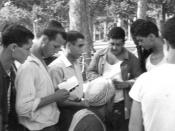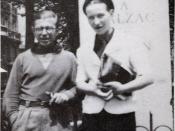During the mid twentieth century, the literary community witnessed the descent of the New Criticism and the emergence of the reader response movement. The reader response movement sharply contrasts the theories of New Criticism in that it focuses on the importance of the reader in the creation of the literary experience. Like New Critics, reader response theorists do not entirely agree on all issues and, consequently, different branches of the movement form. The phenomenological approach represents the notion that the author and reader collaborate to produce the literary work. Phenomenologists credit the reader with having a performative role in the literary experience. Authors such as Jean-Paul Sartre, Wolfgang Iser, and Hans Robert Jauss are associated with the phenomenological approach to literature.
Because the reader response movement is built on the foundation that the audience is an essential part of the literary process, phenomenologists tend to show a great deal of respect for the reader.
In fact, a major underlying theme of this movement is the idea that the reader should be granted freedom to interpret a literary work in any way he/she likes. Jean-Paul Sartre, in his essay entitled "Why Write?", describes this best when he says "the writer appeals to the reader's freedom to collaborate in the production of his work" (627). Wolfgang Iser echoes this belief in the need for readers' freedom in his essay, "The Reading Process: A Phenomenological Approach": "No author worth his salt will ever attempt to set the whole picture before his reader's eyes ... it is only by activating the reader's imagination that the author can hope to involve him and so realize the intentions of his text" (961). Sartre and Iser appear to imply that the reader's freedom and imagination are absolutely necessary in order for the writer to fully achieve...


